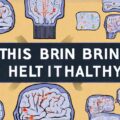The Importance of Choline for Health
Choline is an essential nutrient that plays a vital role in brain development, liver function, metabolism, and other key bodily processes. However, most people do not get enough choline in their diets. Eating choline-rich foods can ensure you meet your daily needs.
What is Choline?
Choline is a water-soluble nutrient similar to B vitamins. It is found naturally in certain foods and also produced by the liver. Choline helps form cell membranes and signaling molecules in the brain and aids in metabolism.
Choline Benefits
- Supports brain development & function
- Helps liver function & fat metabolism
- May lower chronic inflammation
- Important for cardiovascular health
Top Choline Food Sources
The best dietary sources of choline include:
- Beef liver
- Eggs
- Salmon
- Chicken liver
- Brussels sprouts
- Broccoli
- Cauliflower
- Beef
- Milk
- Tofu
Daily Choline Needs
The adequate intake levels for choline are:
- Adult men: 550 mg per day
- Adult women: 425 mg per day
- Pregnant women: 450 mg per day
- Breastfeeding women: 550 mg per day
Increasing Your Choline Intake
Try adding more choline-rich foods like eggs, meat, and cruciferous vegetables to your diet. Consider taking a choline supplement if you have trouble meeting your needs.
Frequently Asked Questions
What does choline do?
Choline supports brain health, liver function, metabolism, nerve signaling, cardiovascular health, and cell membrane integrity. It’s essential for fetal and infant development.
What foods have the most choline?
Beef liver, eggs, salmon, chicken liver, Brussels sprouts, broccoli, cauliflower, beef, milk, and tofu are among the top dietary sources of choline.
Can you get too much choline?
Yes, excessively high choline intake can lead to nausea, vomiting, sweating, fishy body odor, and liver damage. The tolerable upper intake level is 3,500 mg per day for adults.
What are signs of low choline?
Low choline intake can contribute to liver dysfunction, high cholesterol, cognitive deficits, poor muscle control, and increased risk of birth defects during pregnancy.
Do vegetarians get enough choline?
Vegetarians can meet their daily choline needs through eggs, dairy, legumes, grains, nuts and seeds, and cruciferous vegetables like broccoli and Brussels sprouts.









